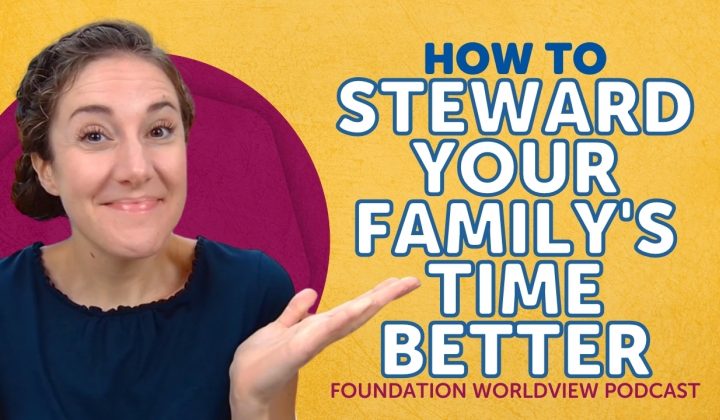Learn more about the journey that led to us equipping kids to carefully evaluate every idea they encounter.
Meet members of our team who have contributed to curriculum development.
Hear from real users of the Foundation Curriculum.
Learn what we believe about God, Jesus, Scripture, and more.
Fighting Consumerism as a Family: Helping Children Fight Coveting and Love Contentment
Hello, friends. Today's podcast question says: "My son has hit an age where he asks nonstop for new toys. He doesn't demand them in an entitled sort of way, but I don't think we can go half the day without him asking to add something to a Christmas or birthday list. How can I gently fight against consumerism as a parent?"
This is an important question for us to think through because this issue of consumerism is huge in our culture. Just think about the fact that we live in a world where, with Amazon Prime, we can get most items delivered to our house within two days. In fact, I know Amazon has started a new service where you can get so many products actually delivered within 12 hours, which is just ridiculous.
On top of this, as a culture, we have stopped focusing on quality items, but have started focusing on quantity of items because we are so used to having things crafted cheaply—and sadly, often through forced labor overseas—that we don't truly value the things that we already have. We're always just looking for more and more and more.
This is not just an issue with our children; this is an issue with us adults as well. So today on the podcast, we're going to look at how we can get to the heart or the root of this issue.
Getting to the Root of the Issue
Now, thinking about this question about how to fight a consumeristic mindset with our children, anytime we want to help our children overcome a struggle or a habit, we have to get to the root of that issue.
It's kind of like if you have a crab apple tree in your backyard and you think, "I don't want these crab apples in my yard. I don't want my kids eating them. It's not good for them. It's poisonous for animals. I want to get rid of these crab apples." Well, what you can do is continue to go out and pull all the crab apples off the tree and put them in the garbage, but what's going to happen? More crab apples are just going to continue to grow.
What you need to do is actually get to the root. You need to dig that tree up by its roots and remove it from your yard. It's similar with any struggle that we have in our lives or our kids have in their lives. We have to get to the root.
So what is the root of consumerism—always wanting more? The root is what the Bible reveals as the sin of coveting. Coveting is desiring what God hasn't given us while not being content with what he has given us.
We will all struggle with coveting to one degree or another until we die or until Jesus returns. However, we want to help ourselves and our children learn to fight this sin of coveting.
Step One: Help Children Understand the Root Sin
The first thing we need to do is help our children understand this root sin—this coveting. A great place to take them is to Exodus chapter 20, verse 17, right at the end of the Ten Commandments. This verse says: "You shall not covet your neighbor's house. You shall not covet your neighbor's wife or his male servant or his female servant or his ox or his donkey or anything that is your neighbor's."
We can ask our kids what truth is revealed by this verse: that we are not supposed to covet anything that God has not given us, but that he has given others.
We can then talk with our kids about how coveting is also believing that the things that we don't have will make us happy—believing that if I have that toy or I have that dessert or I have that item of clothing, or I have that new trinket, or I have this new house, or I have this new car, that an item that we don't have is going to make us happy.
I think an easy way to help our children see this is to share an example of how we have struggled with coveting. Share with your kids about a time when you really, really wanted something and you believed that that thing would make you happy, and then you got that thing and it didn't ultimately provide the happiness that you thought that it would.
I think of myself in times when I order new things. Sometimes we need new things. We need to go to the grocery store every week to get food. If we legitimately are running out of clothes and don't have enough clothes to make it through a week, we do need to buy more clothes. So there are times when we do legitimately need to buy things, but we tend to think that when we get something that we desperately want, it's going to make us happy. But it doesn't.
Ultimately, all things that we can have on this earth are going to fail us because we were designed to be satisfied in Christ alone.
Step Two: Set Healthy Boundaries
Something practical that we can do is set healthy boundaries with our children. Particularly for this questioner, talk with your son about how he is requesting new items for his birthday and Christmas list frequently and say, "You know what? We're going to change something because I don't want your heart and your mind to always be focused on new things that you want. To help you with this, we're not going to put any items on your birthday or Christmas list until I ask you about them."
Then talk with your son about a certain time that you're going to ask him. If his birthday is September 24th, say, "You know what? At the beginning of August, the first week of August, I'm going to ask you what are some gifts that you would like to put on your birthday list?" And then say, "For Christmas, on maybe October 1st or November 1st, I'm going to ask you what are some items you'd like on your Christmas list? But I don't want you to ask me to put any items on that list until I ask you."
When he comes back—because ultimately he's going to eventually forget, especially if he's in this habit of asking you to put things on the list every day—he's going to forget. So when he asks you to put something on the list, remind him: "Oh, remember we set a new boundary. You're not going to ask me to put things on the list anymore. I'm going to ask you on August 1st (or whatever the date is) what you want on your birthday list. It's not that date yet, so we're not going to worry about this."
Step Three: Practice the Antidote to Coveting
The next thing that we need to do with our children is help them practice the antidote to coveting. The New Testament continually shows us this pattern of putting off and putting on. I think a great place where this is modeled is in Colossians 3. Paul gives us a list of things we're supposed to put off and then put on because we can't just take off a sinful pattern. We have to replace it with what is true and what is good and what is beautiful.
What is the antidote to coveting? It's gratitude. Rather than focusing on what we want that God hasn't given us yet, we are to focus on what God has given us and have a grateful spirit for this.
To help our children in this, we can start practicing gratitude daily as a family. Some practical ideas:
- Each evening at dinner, have everybody go around and share one or two things that they're grateful for.
- If you want to, you can even start a gratitude wall. Have one wall in your kitchen or your living room or your dining room or some other room just be a wall where you place sticky notes for things that you're grateful for. Maybe every Sunday afternoon, as you're practicing resting together, you can write down—each of you—one thing that you're grateful for and put that sticky note up on the wall.
- If your children (for example, with this questioner, if your son) are asking for a new thing to put on their list, remind them of this new boundary that you're not going to put new things on their list, but you're going to ask them eventually. Then have them say three things that they already have that they're grateful for.
We need to practice this antidote to coveting, which is putting on gratitude.
Practical Tip: Rotate Toys to Increase Gratitude
Just on a practical note, thinking about this culture where we have so much—even if you don't buy your children lots of new toys, you're going to have so many toys around your house because grandparents and aunts and uncles and friends are all going to be buying your kids toys for their birthday and for Christmas and for other events.
One thing I recommend is that you actually rotate toys out. Don't have all toys available at all times, but have certain toys available at certain parts of the week, or maybe for a month or two, you take certain toys away and you say, "You know what? These are going to be our springtime toys. We're not going to take these out until the spring," or "These are going to be our summertime toys. We're not going to take them out until the summer."
When we have unlimited access to something, it tends to make us callous towards that thing. When there are healthy limits set around something, it tends to increase our gratitude.
I saw this several years ago in my own life. I did something which probably many of you will consider very weird, but it really helped me. There was a company called Wool, and they create dresses made out of Merino wool for women, and they have a hundred-day dress challenge where you buy a dress from them and you commit to, for a hundred days, wear that same dress. Every day you take a picture of yourself in that dress to prove that you wore it. Once you've completed those hundred days, you send in your photos and they send you like a hundred-dollar gift card to their store.
I did this in 2023. I wore the same dress for a hundred days, and I was shocked by how wearing the same thing every day helped me be so grateful for that one dress that I was wearing. Sometimes I'd put a jean jacket over it or a sweater or something, but I became so grateful for that dress. Wearing the same thing every day actually helped me want fewer clothes.
I've gotten into the habit of being really simple in my wardrobe. I've started, once a year or sometimes twice a year, letting myself buy a new dress from that company, and then I'll just wear it over and over and over and over again. It has really helped my heart not be constantly longing for more.
If you can do that with your kids' toys—if you can rotate out toys and have them available during certain times of the year or certain times of the week, or maybe you just have toys that are only available during road trips or toys that are only available on the weekend—by limiting the access, that's a really helpful way to increase gratitude for what we already have.
Summary
Just as a reminder, the recommendations I made are:
- Get to the root of this issue, which is coveting, and reveal that by taking your child to Exodus 20:17
- Help set some healthy boundaries by not allowing him to put new items on his birthday or Christmas list until you ask
- Practice the antidote to coveting, which is gratitude
Ready to Dive Deeper?
As we wrap up today's episode, I want to encourage you to continue this important work of discipling your children with biblical wisdom. If this conversation about fighting consumerism and cultivating gratitude in our families has been helpful to you, I'd love to stay connected and provide you with more practical, biblically-grounded parenting insights.
Join our email list at foundationworldview.com to receive regular encouragement, practical tips, and biblical wisdom for raising children who can carefully evaluate every idea they encounter. Don't miss out on future episodes and resources that will equip you to guide your children toward a Christ-centered worldview in our consumer-driven culture.
And if you're looking for a comprehensive curriculum to help your children develop critical thinking skills rooted in Scripture, I encourage you to explore Foundation Worldview's curriculum. Our materials are designed to help children ask the right questions and find answers grounded in God's truth.
That's a wrap for this episode, but if you have a question that you would like for me to answer on a future Foundation Worldview podcast, you can submit that question by going to foundationworldview.com/podcast.
As we leave our time together, my prayer for you is that no matter the situation in which you and the children God has placed in your care find yourselves, you would trust that God is working all things together for your good, using all things to conform you more into the image of His Son.
I'll see you next time.
Related Posts and insights

Should Your Child Play with Superhero Toys? A Biblical Perspective
In this episode, we explore how to navigate your child’s interest in superhero, magic, and supernatural toys like Spider-Man and Pokémon from a biblical perspective. Learn how to form convictions based on Scripture, while understanding that different Christians may hold varying views. Join us as we dive into how to biblically guide your children in making choices about toys and entertainment.

Screen Time and Dopamine: Is Anything Safe?
Today's question says, "In one of your other podcasts, you said something about screen time and the use of dopamine and the impact on children. I agree and understand your arguments, but are there any videos you can recommend that are okay for our kids?"

Stewarding Your Family's Time Better
Join Elizabeth Urbanowicz as we consider today's question, "how do we as parents navigates sports, hobbies, etc, to steward our family's time better?"



